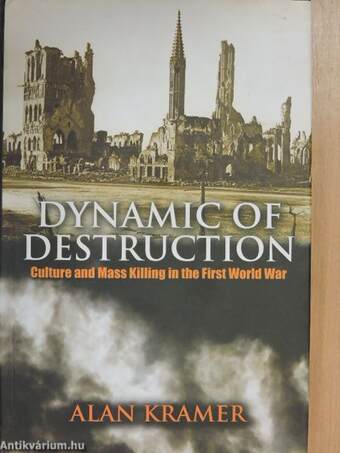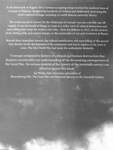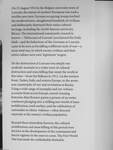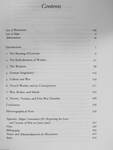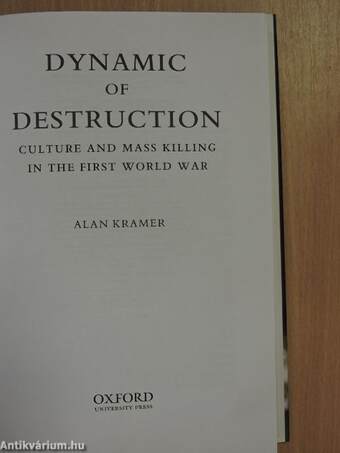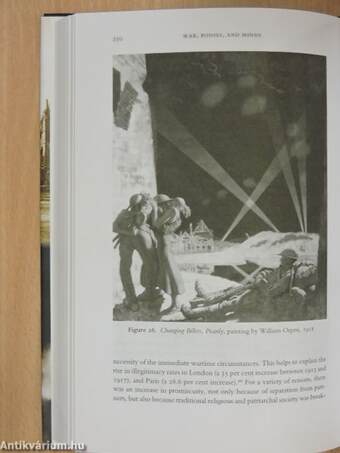1.063.817
kiadvánnyal nyújtjuk Magyarország legnagyobb antikvár könyv-kínálatát

VISSZA
A TETEJÉRE
JAVASLATOKÉszre-
vételek
Dynamic of Destruction
Culture and Mass Killing in the First World War
| Kiadó: | Oxford University Press |
|---|---|
| Kiadás helye: | Oxford |
| Kiadás éve: | |
| Kötés típusa: | Fűzött keménykötés |
| Oldalszám: | 434 oldal |
| Sorozatcím: | |
| Kötetszám: | |
| Nyelv: | Angol |
| Méret: | 24 cm x 16 cm |
| ISBN: | 978-0-19-280342-9 |
| Megjegyzés: | Néhány fekete-fehér fotóval. |
naponta értesítjük a beérkező friss
kiadványokról
naponta értesítjük a beérkező friss
kiadványokról
Fülszöveg
In the final week of August 1914, Germán occupying troops torched the medieval town of Louvain in Belgium, slaughtering hundreds of civilians and deliberately destroying the town's cultural heritage, inciuding its world-famous university library.
The world reacted in horror. Yet the 'Holocaust of Louvain was not a terrible one-off tragedy. It was the herald of things to come in a wider wave of cultural destruction and mass killing that swept the world at this time - from the Balkans in 1912, via the western front, Turkey, Italy, and eastern Europe, to the catastrophe of war and revolution in Russia.
Beyond these immediate horrors, the cultural mobilization and mass killing of this period were decisive in the development of the communist and fascist regimes in the years to come. The First World War had made the unthinkable thinkable.
CA unique comparative history of cultural and humán destruction that
deepens considerably our understanding of the devastating consequences of... Tovább
Fülszöveg
In the final week of August 1914, Germán occupying troops torched the medieval town of Louvain in Belgium, slaughtering hundreds of civilians and deliberately destroying the town's cultural heritage, inciuding its world-famous university library.
The world reacted in horror. Yet the 'Holocaust of Louvain was not a terrible one-off tragedy. It was the herald of things to come in a wider wave of cultural destruction and mass killing that swept the world at this time - from the Balkans in 1912, via the western front, Turkey, Italy, and eastern Europe, to the catastrophe of war and revolution in Russia.
Beyond these immediate horrors, the cultural mobilization and mass killing of this period were decisive in the development of the communist and fascist regimes in the years to come. The First World War had made the unthinkable thinkable.
CA unique comparative history of cultural and humán destruction that
deepens considerably our understanding of the devastating consequences of
the Great War. No serious student of the history of the twentieth century can
afford to ignore this book.'
Jay Winter, Yale University, and author of Remembering War: The Great War and Historical Memory in the Twentieth Century
On 25 August 1914 in the Belgian university town of Louvain, the nature of modern European war took a terrible new turn. Germán occupying troops torched the medieval town, slaughtered hundreds of civilians, and deliberately destroyed their entire cultural heritage, including the world-famous university library. The international community reacted in horror—'Holocaust of Louvain proclaimed the Daily Mail—and the behaviour of the Germans at Louvain came to be seen as heralding a different style of war—a more totál war, in which enemy civilians and their entire culture were now'legitimate' targets.
Yet the destruction at Louvain was simply one symbolic moment in a wider wave of cultural destruction and mass killing that swept the world at this time—from the Balkans in 1912, via the western front, Turkey, Italy, and eastern Europe, to the seven-year catastrophe of war and revolution in Russia. Using a wide rangé of examples and eye-witness accounts from across Europe, award-winning histórián Alan Kramer paints a picture of an entire continent plunging into a chilling new world of mass mobilization, totál warfare, and the celebration of nationalist or ethnic violence—often directed expressly at the enemy s civilian population.
Beyond these immediate horrors, the cultural mobilization and mass killing of this period were decisive in the development of the communist and fascist regimes in the years to come. The First World War had made the unthinkable thinkable. Vissza
Témakörök
- Idegennyelv > Idegennyelvű könyvek > Angol > Művelődéstörténet
- Idegennyelv > Idegennyelvű könyvek > Angol > Történelem > Európa története > Egyéb
- Művelődéstörténet > Kultúra > Története
- Művelődéstörténet > Átfogó művek, tanulmányok
- Történelem > Idegennyelvű > Angol
- Történelem > Kontinensek szerint > Európa, európai országok története > Egyéb
- Történelem > Legújabb kor > I. világháború
- Történelem > Monográfiák > Világtörténelem
- Történelem > Hadtörténet > Háborúk, csaták
Alan Kramer
Alan Kramer műveinek az Antikvarium.hu-n kapható vagy előjegyezhető listáját itt tekintheti meg: Alan Kramer könyvek, művekMegvásárolható példányok
Nincs megvásárolható példány
A könyv összes megrendelhető példánya elfogyott. Ha kívánja, előjegyezheti a könyvet, és amint a könyv egy újabb példánya elérhető lesz, értesítjük.



